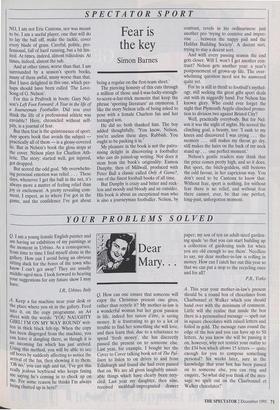SPECTATOR SPORT
Fear is the key
Simon Barnes
NO, I am not Eric Cantona, nor was meant to be. I am a useful player, one that will do to lay the ball off, make the tackle, cover every blade of grass. Careful, politic, pro- fessional, full of hard running, but a bit lim- ited. At times, indeed, almost ridiculous. At times, indeed, almost the sub.
And at other times, worse than that. I am surrounded by a season's sports books, many of them awful, many worse than that. But I have delighted in this one, which per- haps should have been called 'The Love- Song of G. Nelson'.
For this is Prufrock in boots: Gary Nel- son's Left Foot Forward: A Year in the life of a Journeyman Footballer. Did you ever think the life of a professional athlete was enviable? Here, chronicled without self- pity, is a journal of fear.
But then fear is the quintessence of sport. Any sports book that avoids the subject — practically all of them — is a glossy-covered lie. But in Nelson's book the gloss stops at the cover. Nelson plays for Charlton Ath- letic. The story: started well, got injured, got dropped.
But scored the odd goal. 'My overwhelm- ing personal emotion was relief. . . . These days, whenever I get the ball in the net, it's always more a matter of feeling relief than Joy or excitement. A pretty revealing com- ment, I expect, as to where I've got in the game, and the confidence I've got about being a regular on the first-team sheet.' The piercing honesty of this cuts through a million of those and-I-was-lucky-enough- to-score-a-hat-trick memoirs that keep the phrase 'sporting literature' an oxymoron. I like the story Nelson tells of being asked to pose with a female Charlton fan and her teenaged son. He did so; both thanked him. The boy added thoughtfully, 'You know, Nelson, you're useless these days. Rubbish. You ought to be packing it in.' My pleasure in the book is not the patro- nising delight in discovering a footballer who can do joined-up writing. Nor does it stem from the book's originality: Eamon Dunphy, then of Millwall, produced with Peter Ball a classic called Only A Game?, one of the finest football books of all time.
But Dunphy is crazy and bitter and reck- less and moody and bloody and an outsider. His book is about an exceptional man who is also a journeyman footballer. Nelson, by contrast, revels in his ordinariness: just another pro 'trying to contrive and impro- vise . . . between the nappy pail and the Halifax Building Society'. A decent sort, trying to stay a decent sort.
And with every passing season the end gets closer. Will I, won't I get another con- tract? Nelson gets another year: a year's postponement of grown-up life. The over- whelming question need not be answered quite yet.
For he is still in thrall to football's mythol- ogy, still seeking the great gifts sport deals out with its niggardly hand. For Nelson has known glory. Who could ever forget the night that Plymouth Argyle clinched promo- tion to division two against Bristol City?
Well, practically everybody. But for Nel- son it was the night of nights. He scored the clinching goal, a beauty, too: sank to my knees and discovered I was crying . . . the memory . . still makes my throat go dry, still makes the hairs on the back of my neck stand up . . . one perfect moment.'
Nelson's gentle readers may think that the price comes pretty high, and so it does. But sport, the bitch-goddess, still bestows the odd favour, in her capricious way. You don't need to be Cantona to know that. Without fear, sport is nothing, for without fear there is no relief, and without fear there cannot, ever, be that one perfect, long-past, unforgotten moment.










































































 Previous page
Previous page